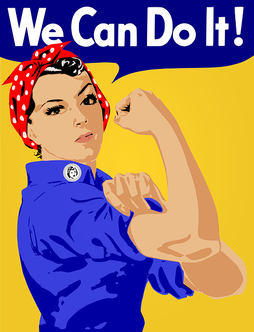Trust the process. To complement last week’s article on fat loss, this week I aim to cover three of the most common reasons why you might be struggling to gain muscle despite your best efforts. 1. You aren’t in a calorie surplus
If you never hit your calorie and macronutrient targets and you skip or forget meals, then obviously you can’t expect to be in a calorie surplus. However, not eating enough isn’t the only reason you might be eating at maintenance, or even in a slight deficit. Another potential culprit could be your Non-Exercise Activity Thermogenesis (NEAT). NEAT is the energy we expend doing anything that isn’t regimented training. This includes going up and down stairs, walking to the store, doing the house chores, fidgeting, blinking, and moving around the house. When you ramp up the amount of food you are eating, NEAT also tends to increase to make use of the extra energy. For some people, who struggle with weight gain more than most, this rise in NEAT might mean they remain at maintenance despite eating more calories. For example, if you are tracking your steps, you might notice they go up when you are in a surplus. Even if your steps don’t change, you may be getting more active than you realise: maybe you are tapping your foot more often when you’re sitting, tossing and turning more in bed, or even releasing more heat (and sweating more) when you’re working out. Due to the fact that the human body prefers homeostasis, the state in which everything is in balance – including the energy you obtain from food and then burn during the day – we tend to try to resist both fat loss and muscle gain, which are the results of an imbalance. For instance, if you are eating less, exactly the opposite of what I just discussed may occur: your NEAT levels may decrease as the body is attempting to save more energy. So, if your weight isn’t increasing at your desired rate and you have been dieting to gain muscle for more than two weeks, try a 10 to 20% increase in your current calories, even if you think they already technically put you in a surplus. 2. You are scared of gaining fat Every day, we are bombarded with the idea that losing weight is good and gaining weight is bad. Of course everyone, regardless of gender, is going to be scared of stepping on the scale and seeing a different number. It is inevitable to gain some fat when your goal is to accrue more muscle mass. Even when you do everything perfectly, there is no avoiding it. When we decide to build muscle, many of us may get started with great motivation, but, as soon as abs look a little less defined, legs and arms look a little bit chunkier, and we feel a bit “fluffy,” we freak out and bring our calories down right away, never giving our body a chance to develop more lean tissue. This roller coaster usually results in a prolonged maintenance phase rather than a steady upward trend. I spent about five months stuck in this rut after my fat loss diet last year, despite telling myself on a regular basis that I had to gain some weight if I hoped to put on more muscle. One way to overcome adipophobia is to have realistic expectations when you transition into a gaining phase. This is a short list of helpful reminders:
3. You aren’t making the best food choices In general, eating plenty of lean protein sources, high-fibre, carbohydrate-rich foods, and unsaturated dietary fats is a great idea to improve health and maintain it over the years. However, if you are interested in body composition and you are struggling to gain, chances are you might be a little too strict about this type of diet and never allow yourself to “stray” away from “clean eating.” The downside to these “whole” foods is that they make it harder to stay in a calorie deficit for the simple reason that they fill you up easily. For example, you could get 300 calories from 300gr of potatoes or from a small McDonald’s burger. Which one is going to be easier to eat? As mentioned in the previous article, for weight gain and loss food quantity trumps quality. Consuming “dirty” foods is not going to make you gain more fat than if you had eaten the same amount of calories from “clean” foods. In fact, fighting the “bad vs good food” mentality will have a positive influence on your mental health. Not only that, but, if having slightly more calorie-dense foods helps you hit your calorie target, then you will be able to gain more muscle. It’s a double win! Clearly, I’m not saying you should switch from “healthier” foods to “junk” foods altogether. Rather, if you are eating a 100% “clean” diet, shifting the ratio to 80/20 or 70/30 might help you feel less full, reduce bloating, and make the muscle-gaining process a little easier and your diet a little more fun. In Future Episodes: How can you make healthy choices when you are on a budget? Learn about it in the next article! Your Turn: How is your muscle-gaining phase going?
0 Comments
Your comment will be posted after it is approved.
Leave a Reply. |
Nikias TomasielloWelcome to my blog. I’m an online fitness coach with a passion for bodybuilding, fantasy, and bread. Want to work with me? Check out my services!Archives
May 2024
Tags
All
|
Follow me on social media |
Get in touch |
© 2018-2023 Veronica Tomasiello, known as Nikias Tomasiello – All rights reserved


 RSS Feed
RSS Feed